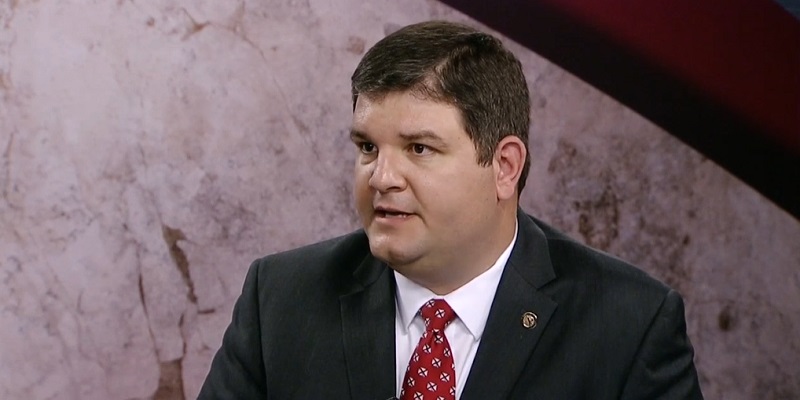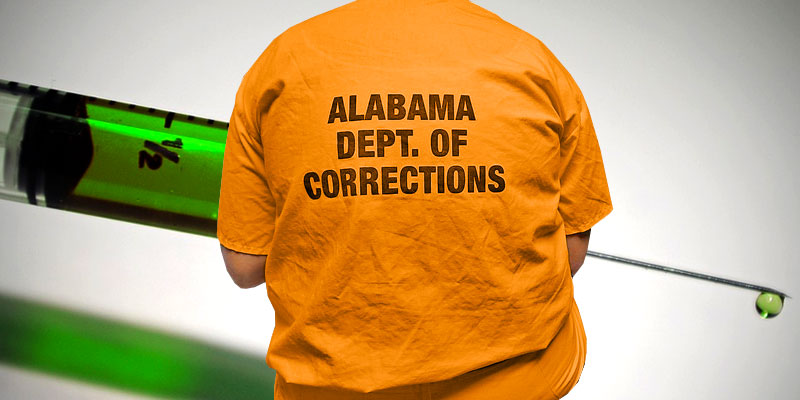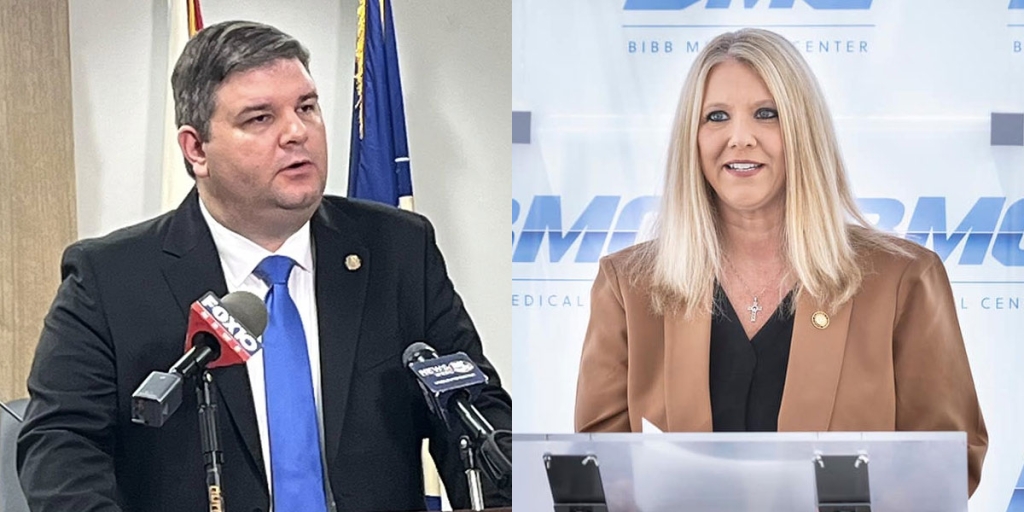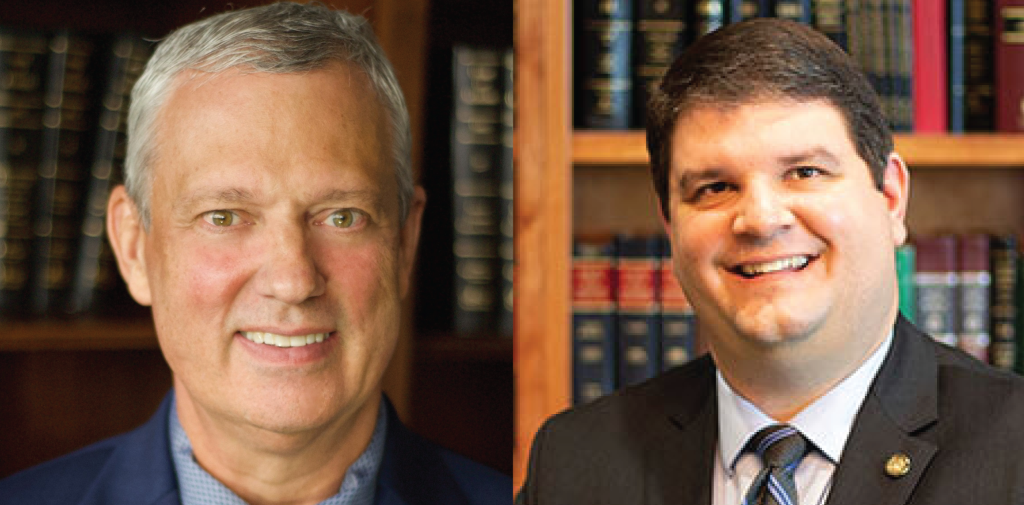With just over 70 days until the 2020 legislative general session, there is a high probability at the top of the list of priorities will be prison reform.
Earlier this year, the U.S. Department of Justice issued a report outlining its concerns with the Alabama Department of Corrections’ prison facilities, which it said could violate the “cruel and unusual punishment” provision of the Eighth Amendment of the U.S. Constitution. One proposal offered by lawmakers, including Sen. Cam Ward (R-Alabaster) and others, is to take on sentencing reform, which in theory would lessen sentences for some crimes and potentially lessen the burden on overcrowded prisons.
Count State Rep. Matt Simpson (R-Daphne) as a “no” on sentencing reform as a potential component to prison reform in 2020. During an appearance on Huntsville radio WVNN’s “The Jeff Poor Show,” Simpson argued against sentencing reform.
“It is not as cut and dried as some people are trying to make it seem,” he said. “The Department of Justice – what their report indicated, you know, there’s different things we have to take care of. We have to take care of overcrowding. We have to take care of the inmates that we have in there to make sure they’re safe where they are. No one deserves to be unsafe where they are, no matter what crime they have committed. So we have to take care of the people we are responsible to take care of because they’re in prison.”
“That next step is where I really can’t get on board when people are talking about sentencing reform,” he continued. “I don’t think sentencing reform – I don’t think it is needed. I don’t think it is necessary. I know in the Department of Justice report that they issued out, sentencing reform is not mentioned in that report. I think some people like to take an opportunity when you’re looking at prisons, and when you’re looking at what’s going on to include sentencing reform in there. I don’t think it is needed. I think the data is what we’ve been told, and what we’ve been shown is the people who are in prison currently are people that need to be in prison. You have a lot of Class A, Class B felons that are in prison. You have a lot of repeat offenders that are in prison. It’s not your first-time offender. It’s not your non-violent [offender]. There’s just not a lot of people that are in there just for drugs. So, I don’t think we need to have sentencing reform. I don’t think we need to bring that down.”
Simpson, who was a career prosecutor prior to his election to the Alabama legislature in 2018, warned lessening the consequences of a crime would weaken corrections as a deterrent.
“I would be against sentencing reform based on what I know,” Simpson said. “I was a prosecutor for 12 years. I know how difficult it is for somebody to be sent to prison. I know how fast people are being released from prison. Now, that may have changed recently with the appointment of Charlie Graddick as the director of Pardons and Paroles, and I think they’re doing a good job there in keeping people there that need to be there. I know Judge Graddick well, and I respect the job he has done. I don’t think that we need to focus and say, ‘How do we get more people out?’ If you read Attorney General Steve Marshall’s letter to the editor that he sent out to the state this week, you see that it is violent offenders that are there. Part of our prison system, part of our justice system, is not just to rehabilitate. Rehabilitate is an important factor. We need to make sure people can have jobs when they get out. We need to make sure these people have a trade when they get out that they can be productive members of society. Ninety-five percent of the people that go to prison are going to get out.”
“I respect everything about making sure that they can be productive members of society afterward,” he continued. “However, we have a responsibility for the victims of crime to make sure if someone commits a violent offense, if somebody does something to harm another person, that person needs to be sent away. We need to be able to show someone there’s punishment for committing a crime. We need to be able to show the community that if this person commits this crime, they’re going to go away for a while. If you’re sitting next to someone – imagine, a 16-, 17-, 18-year-old kid and you’re in class, and you see someone has committed a violent felony, and the next day they’re right back in class, what deterrent do you have to say, ‘You know what? I’m not going to commit that violent felony. We have to be able to say you’re going to go away. If you do the crime, you’re going to do the time, especially if you’re talking violent felonies.”
“Our prison system right now – at least 75% of the people in there are violent felonies, or they’re Class A or Class B,” Simpson added. “And if we don’t follow the rule of law, if people get in and they get sentenced to 10 or 15-year sentences and they actually only serve only six months or eight months, which is generally what they’re doing before Judge Graddick took over – that’s a problem. That’s a problem in our society, and I don’t know that sentencing reform is the answer here.”
According to the Baldwin County Republican, an appropriate measure would be to expand prison capacity and apply truth to sentencing, which he argued would also correct sentencing issues.
“I think you have to do capacity,” he said. “I think you have to build more prisons to add more people to be there. I think one of the more important things you have to ask for is truth in sentencing. And what that means is if you’re sentencing someone for the crime they committed, they should do that time or around 85% of that time, and that’s going to bring your sentences down because right now, if you know – I can tell you right now a 10-year sentence is about six months. A 15-year sentence is about eight months in the Department of Corrections. Preface everything I say that was before Judge Graddick. But if you’re sentencing someone and you know they’re only going to be in prison for six months, well then you’re not going to come down on your sentence. You’re not going to say I’ll give you a year and a day, or I’ll give you 18 months. You’re going to say, ‘Well, I’ll give you 10 years,’ and you’ll do six months and you’ll be right back out on the street. If we had truth in sentencing – if we could tell someone, if we could tell a victim – you look a victim in the eye and you say this person that assaulted you, or this person that did something to you – this person will be in jail for four years. They’re going to go for four years – four years to the day when they go to sleep at night, there’s going to be a clang of the door, and they’re going to have their head on a pillow, and it’s going to be laid out behind bars somewhere. Right now, we can’t do that at all. We’re telling people I have no idea how long the people are going to be in the Department of Corrections. It’s completely up to them. They may be out in six months. That’s what you have to tell a victim, and it’s tough. It’s tough to be a part of that. And that’s not what everybody sees on the day-to-day operations on how our prison system currently is operating.”
@Jeff_Poor is a graduate of Auburn University, the editor of Breitbart TV and host of “The Jeff Poor Show” from 2-5 p.m. on WVNN in Huntsville.













